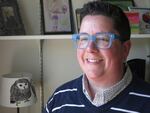The World Health Organization just classified "gaming disorder" as a mental health condition.
The WHO delayed making the decision last year, to give scientists more time to research the idea. But Oregon's Lewis and Clark College didn't wait. It's been running a Gaming and Tech in Excess program at its clinic in Southwest Portland for a couple of years now.

Cort Dorn-Medeiros teaches Lewis And Clark students how to counsel people with gaming disorders, at the schools clinic in Southwest Portland.
Kristian Foden-Vencil / OPB
Clinic director Cort Dorn-Medeiros says about 50 counseling students rotate through the clinic, learning how to treat people who spend their days glued to a screen. "We've seen youth, we've seen grown adults individually, we've seen families."
“They had lost a job, they had to move back in with family, or perhaps they didn’t launch per se, because they were gaming all day or all night, you know not sleeping, having some health issues.”
Dorn-Medeiros said the program started after Lewis and Clark held informational meetings on the subject for a few local families. “We started offering these one-hour parent education nights, along with teachers and staff if they wanted to attend. And we found those to be pretty successful.”
The clinic began getting more and more requests for help. “Last summer we found we had quite a few parents who were bringing in their 19-year-olds because they’d gone off to college, didn’t do very well, at least from the parents' point of view, because they were gaming all the time," Dorn-Medeiros said. "You know when they were at home and at high school, the parent could manage their life for them a little bit … but once they were out on their own, it just wasn’t working.”
The American Academy of Pediatrics recommends no screen time for infants and a limit of one hour a day for two-to-five-year-olds. For kids older than six, the academy says parents should keep tech out of the bedroom and put consistent time constraints on use.
The rule of thumb for identifying a gaming disorder is that screen time shouldn’t replace healthy activities like sleeping, social interactions and exercise.
Dorn-Medeiros said that like any other addiction, there’s no easy fix for gaming disorders. The first thing is for a counselor to build trust with patients and get them to honestly outline how much time they spend plugged in and what effect it’s having on their lives. “We really have to start with ‘Where is this person’s motivation to change?’ Because ultimately they have to be somewhat bought-in so that … change is possible. And second of all that they believe that they can change.”
Dorn-Medeiros said ending a gaming disorder starts with agreeing to take breaks — to walk away from the game, even if only for five minutes. Gamers then need to think about whether they actually want to go back to the screen, or whether doing something else might be more enjoyable.
The Lewis and Clark clinic isn’t dedicated solely to gaming disorders. The students deal with everything from addiction to mental health and marriage counseling.
The World Health Organization has now included gaming disorder as a mental health condition in the 11th edition of the International Classification of Diseases.
Researchers use the ICD to count deaths, diseases, injuries and symptoms. Health care companies use it as a basis for reimbursement.
